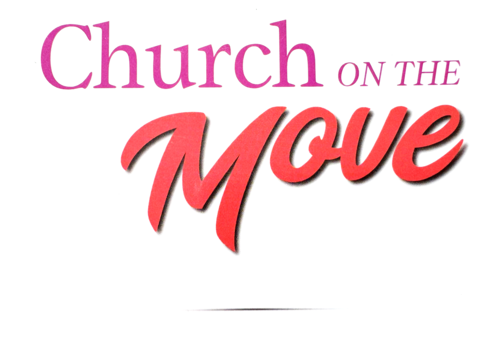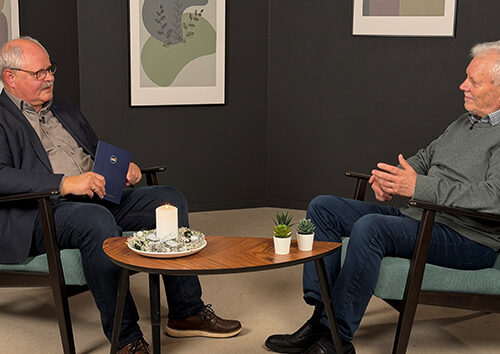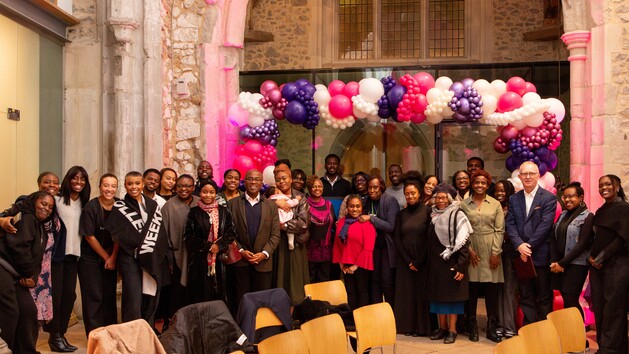25 April 2024| St. Albans UK [Adrian Peck with tedNEWS]
Practices or People?
When Anywhere Church started, there were tough but rewarding times to begin with. The small community of ten people pulled together in the face of adversity. What made them stand out was, astonishingly, all the members were left-handed. At first, this was a bit of a quirky coincidence that made them smile, but soon they started to find they had a sense of togetherness and an identity because of their shared left-handedness. When they met and greeted each other, it was not with the right-handed shake of hands that a right-sided dominated society demanded of them, but with heartfelt left-handed shakes. They started to vote with their left hands, high five with their left hands; never had they experienced such freedom to be who they really were.

Initially, they seemed to attract only left-handed people, and the bond between them just grew stronger. At the Anywhere Church, there was a lack of restrictions found nowhere else in town. Even the guitarists played left-handed instruments instead of being forced by a biased right-handed society into using right-handed equipment. When they eventually moved into their own building, the doors were designed for the benefit of left-handed people. In the stationery cupboard could be found only left-handed scissors and pencil sharpeners. The kitchen was stocked with all sorts of left-handed equipment ranging from can openers to peelers.
But then… some right-handed people began to turn up.
From time to time, some right-handed people began to turn up. They were heartily welcomed, of course, but remained in the minority. The two hands lived happily together, the left-handedness of the majority dominating how things were done, whilst the right-handers who came were quite content just to fit in. As every instrument and utensil was designed for the left-handed, the right-handed were satisfied to do no more than the most menial of tasks.
Months turned into years, and eventually became decades. Anywhere Church had continued to welcome the right-handed, but was still a church where the vast majority were left-handed – and it was this group that continued to flourish and dictate how things should be done. But one day, a group of right-handers moved into the area and started to attend Anywhere Church. There were thirty of them. As they settled, it seemed they took what was a left-handed dominated church in their stride.

Then things started to go wrong. Right-handed children were learning to play musical instruments, and one young lad had the temerity to turn up to the service asking to help out with the music. Wouldn’t you know it – he was playing a right-handed guitar. In the nicest possible way, the local, left-handed elder suggested that before the young person played, they ought to take it to the church board.
Top of board agenda: the problem of right-handed people!
At the next board meeting, the subject of the influx of right-handers was top of the agenda. It turned out that right-handed guitars were not the only problem disturbing the relative calm and tranquillity normally to be found in the Anywhere Church. At first, there were just whispers. These became suggestions. Soon they turned into reports. Appallingly, some of the people were coming to church and shaking hands, and they were not doing it with the correct left hand!
Some members were beside themselves to think that people had brought right-handed grips into the church building. Others thought that this was an anti-left-handed conspiracy designed to split the church apart and bring in dubious right-handed theology. One person suggested that promoting this new form of handshake was all down to a local secret society whom they had heard was trying to infiltrate Anywhere Church.

The elder was tasked with going back to the young lad’s parents and politely declining the offer to help by contributing to the music in worship. The deacons were charged with keeping an eye out for and then eradicating right-handed shakes with a firm but fair dose of policing. Now, right-handed people were tolerated rather than welcomed and later they stopped attending at all.
No one can blame left-handed people for being left-handed. It is like trying to blame basketball players for being tall. Yet, this church community allowed one aspect of who they are turn into a boundary that many others could not breach. It was not there to begin with, but was constructed slowly over time, metaphorically brick by brick, thought by thought, act by act, all building on what came before until it seemed as if this is the way things should be.
This is ridiculous right? We would never lose sight of what is important like the fictional Anywhere Church members… would we? Well, that is until someone tries to change something we have been doing since the wheel was invented. Move or change the pulpit, disband the platform party, change the services’ start times, put the Sabbath School Lesson Study after instead of before the worship service, in fact call the Divine service the worship service… do any of these things and more and then sit back and wait for the debates and resistance to ensue… because they will.
I’ve been party to such discussions over the years and it makes not one iota of difference if it is pointed out that none of these things are stipulated in any way in Scripture. They are all practices that must have made good sense to adopt at the time, but as the years passed, they became calcified and theologised and seemingly immovable.
For example, I was once part of a singing group that was visiting a church and we were asked to not only perform some items, but lead out in their song service. As the song service got underway, the member of our group who was orchestrating proceedings asked the congregation to stand. Immediately, a voice from one of the members of the platform party sitting behind us shouted out, “we don’t stand for song service!” In that congregation, they only stand for hymns sung between the invocatory and benedictory prayer apparently.
Going back to the beginning of the story of Anywhere church can be helpful in formulating a way forwards. Their left-handed bias was simply informed by meeting the needs of the people. They started with a person-centric approach in other words. However, when the make-up of the congregation changed, as it inevitably does, it was not people who were the focus, but their practices. Instead of practices serving people, people started serving the practices.
How can we ensure that practices serve people and where is God in all of this? Well, a little reframing of the questions we ask might be in order.
Rather than asking:
“What music is right?”
We might ask:
“What music will best help those we are reaching encounter God in worship?”
In place of asking:
“What service format do we follow in this church?”
How about investigating:
“What elements of worship will enable worshippers to experience God’s presence?”
Instead of asking,
“Shouldn’t we have a platform party because that’s what makes us Adventist?”
We could ask:
“How can the church community best be led in worshipping our Creator God?”
Feature Image: The Stanborough Press
All other images: Shutterstock
Excerpts from Peck’s book, Church on the Move – From Isolation to Community, recently published by Stanborough Press, features in every regular edition of tedNEWS from January to September 2024. In doing so, we’re inviting you to become a fellow traveller with Peck. Interestingly, his book offers ‘movements’ rather than ‘chapters’ to encourage a sense of the reader ‘being in transition’. If there was a book that particularly aligns and wrestles over the meaning of the Trans-European Division’s three strategic values to Extend Love, Grow Lifelong Disciples, and Multiply Communities, it is this one.
Copies of Church on the Move are available from Life Source Christian Bookshop (the retail outlet of The Stanborough Press). The book is also available as an eBook for Kindle. [Photos: Stanborough Press (featured image)
- ‘Movement 1’, The Question of Neighbourliness first published in the January edition of tedNEWS asked the question, “Am I being a neighbour without limits, qualifications, equivocation, or hesitation?”.
- ‘Movement 2’, Bad Breath, Awkward Silences, and the Art of Being Uncomfortable invited us to dare imagine the church community as a foretaste of the Kingdom of God.
- ‘Movement 3’, When will you become like us? Or should we be asking when will you become like Jesus?
- Continued in the May edition of tedNEWS, ‘Movement 5’, ‘Human Waste and Human Beings’.



